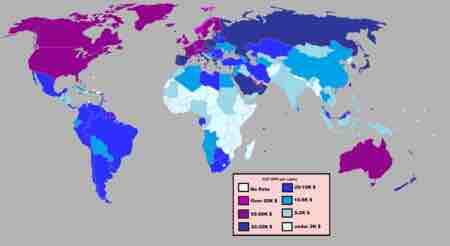Gross domestic product (GDP) due to its relative ease of calculation and definition, has become a standard metric in the discussion of economic welfare, growth and prosperity. However, the value of GDP as a measure of the quality of life for a given country may be quite poor given that the metric only provides the total value of production for a specific time interval and provides no insight with respect to the source of growth or the beneficiaries of growth. Therefore, growth could be misinterpreted by looking at GDP values in isolation.
Limitations of GDP
Simon Kuznets, the economist who developed the first comprehensive set of measures of national income, stated in his first report to the US Congress in 1934, in a section titled "Uses and Abuses of National Income Measurements":
"Economic welfare cannot be adequately measured unless the personal distribution of income is known. And no income measurement undertakes to estimate the reverse side of income, that is, the intensity and unpleasantness of effort going into the earning of income. The welfare of a nation can, therefore, scarcely be inferred from a measurement of national income. "
Following on his caution with respect to economic extrapolations from GDP, in 1962, Kuznets stated: "Distinctions must be kept in mind between quantity and quality of growth, between costs and returns, and between the short and long run. Goals for more growth should specify more growth of what and for what. "
The sensitivities related to social welfare has continued the argument specific to the use of GDP as a economic growth or progress metric.
Austrian School economist Frank Shostak has noted: "The GDP framework cannot tell us whether final goods and services that were produced during a particular period of time are a reflection of real wealth expansion, or a reflection of capital consumption. For instance, if a government embarks on the building of a pyramid, which adds absolutely nothing to the well-being of individuals, the GDP framework will regard this as economic growth. In reality, however, the building of the pyramid will divert real funding from wealth-generating activities, thereby stifling the production of wealth. "
GDP as an Evaluation Metric
Although GDP provides a single quantitative metric by which comparisons can be made across countries, the aggregation of elements that create the single value of GDP provide limitations in evaluating a country and its economic agents. Given the calculation of the metric, a country with wide disparities in income could appear to be economically stronger than a country where the income disparities were significantly lower (standard of living). However, a qualitative assessment would likely value the latter country compared to the former on a welfare or quality of life basis .

GDP across the globe
GDP can be adjusted to compare the purchasing power across countries but cannot be adjusted to provide a view of the economic disparities within a country.
Therefore, GDP has a tremendous big-picture value but policymakers would be better served using other metrics in combination with the aggregate measure if and when social welfare is being addressed.